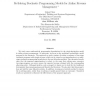Free Online Productivity Tools
i2Speak
i2Symbol
i2OCR
iTex2Img
iWeb2Print
iWeb2Shot
i2Type
iPdf2Split
iPdf2Merge
i2Bopomofo
i2Arabic
i2Style
i2Image
i2PDF
iLatex2Rtf
Sci2ools
102
click to vote
ANOR
2010
2010
Re-solving stochastic programming models for airline revenue management
We study some mathematical programming formulations for the origin-destination model in airline revenue management. In particular, we focus on the traditional probabilistic model proposed in the literature. The approach we study consists of solving a sequence of two-stage stochastic programs with simple recourse, which can be viewed as an approximation to a multistage stochastic programming formulation to the seat allocation problem. Our theoretical results show that the proposed approximation is robust, in the sense that solving more successive two-stage programs can never worsen the expected revenue obtained with the corresponding allocation policy. Although intuitive, such a property is known not to hold for the traditional deterministic linear programming model found in the literature. We also show that this property does not hold for some bid-price policies. In addition, we propose a heuristic method to choose the re-solving points, rather than re-solving at equally-spaced times ...
ANOR 2010 | Mathematical Programming Formulations | Programming Formulation | Two-stage Stochastic Programs |
| Added | 08 Dec 2010 |
| Updated | 08 Dec 2010 |
| Type | Journal |
| Year | 2010 |
| Where | ANOR |
| Authors | Lijian Chen, Tito Homem-de-Mello |
Comments (0)

